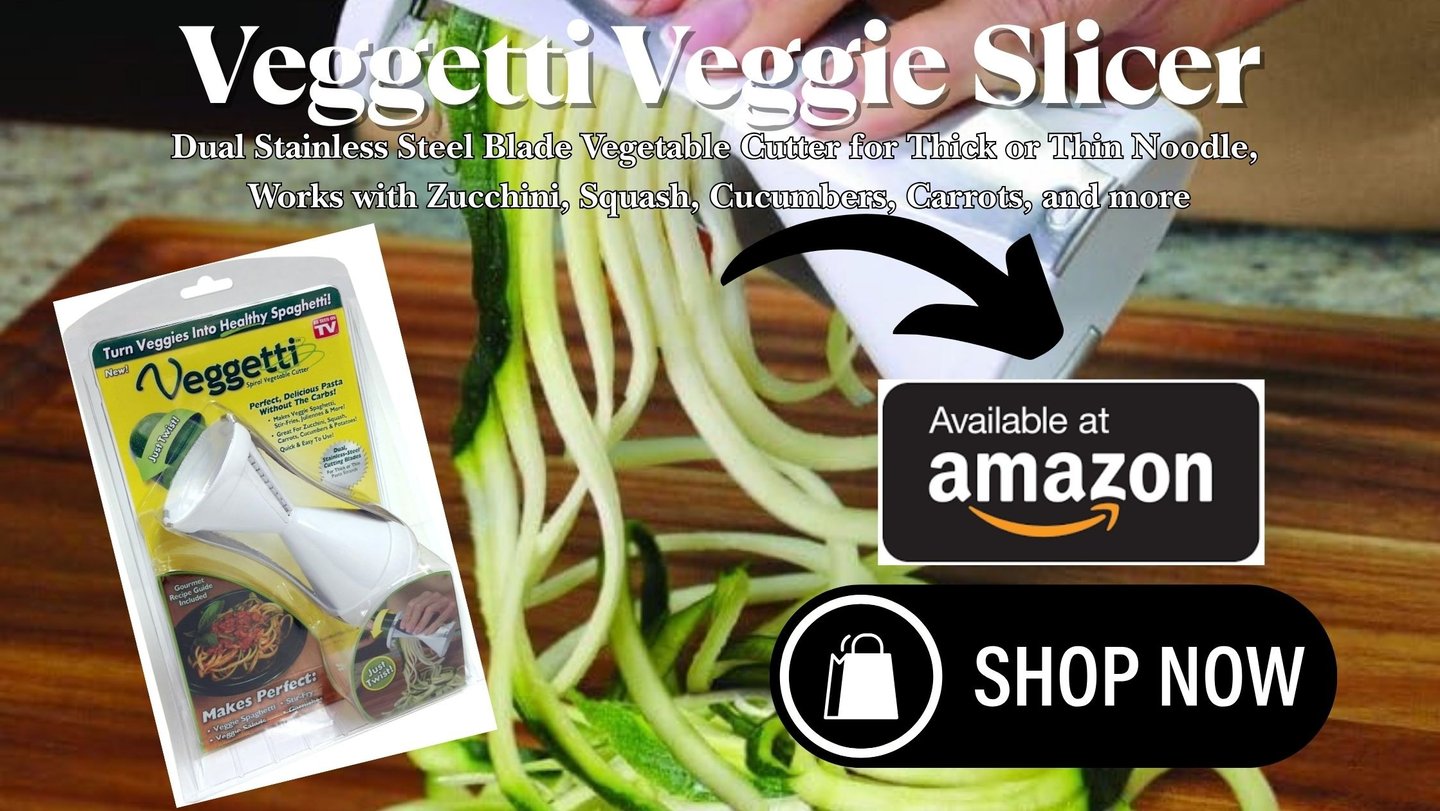Zucchini Benefits Explained: A Guide to a Healthier You
Zucchini benefits go beyond taste, helping your heart stay strong, your skin glow, and your body feel refreshed all year long.
SPECIAL DIETS
Shari Smith
9/5/202512 min read
This post may contain affiliate links, and I may earn a commission if you choose to make a purchase through them.


When zucchini lands on my kitchen counter, I know I’m in for something healthy and delicious.
This mild-tasting summer squash isn’t just for spiralizing or grilling at backyard cookouts—it's become a go-to favorite because it fits so many recipes and delivers a real punch of nutrition.
People keep reaching for zucchini thanks to its light flavor and the long list of zucchini benefits I've seen firsthand.
Adding zucchini to meals can support better health in simple, tasty ways.
From keeping calories in check to loading up on vitamins and fiber, I love how easy it is to work this vegetable into almost anything.
Let’s break down the health perks that make zucchini such a smart pick for any kitchen.
Nutritional Value of Zucchini
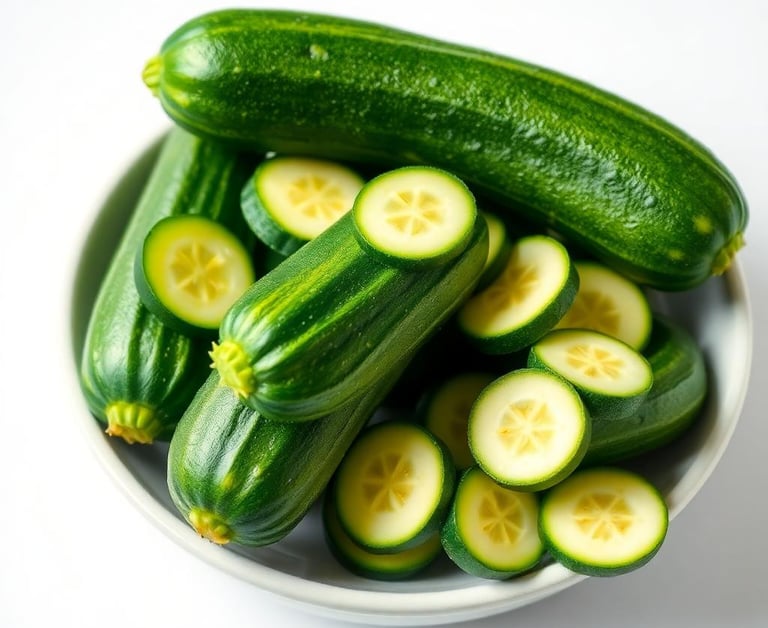

Zucchini holds a spot in my kitchen not just for its mild taste but for the strong nutrition punch it brings to every meal.
Whether you slice it, roast it, or blend it into a soup, this summer squash fits right in with any eating style.
To really understand why zucchini benefits matter, it helps to look at what’s inside every crisp green bite.
I pay attention to how it stacks up nutrient-wise and how it can help me reach my health goals without fuss.
Low in Calories, High in Water
When I want to fill my plate without the heavy calorie count, zucchini is one of my top picks.
Packed with water, it makes meals feel more satisfying while keeping the calorie tally in check.
Calories per cup (raw, sliced): About 19
Water content: Nearly 95%
These numbers show why zucchini benefits anyone looking for lighter options, especially compared to starchy vegetables like potatoes or corn.
That high water content helps my body stay hydrated too, which can make a difference in warmer months or after exercise.
A Good Source of Fiber
Zucchini delivers fiber with every bite—but not in an overpowering way.
The fiber in zucchini helps keep digestion on track and supports a feeling of fullness that can fight off random snacking.
Dietary fiber (per cup, raw): Roughly 1 gram
Unlike heartier vegetables such as broccoli or carrots, zucchini’s fiber is gentle and easy to mix with other foods. I appreciate that balance when I’m after smoother digestion without the bloat.
Packed with Key Vitamins
If vitamins matter to you, zucchini benefits will feel even clearer.
It’s rich in vitamins that support the immune system, eye health, and cell repair. Some of these stand out more than others:
Vitamin C: Supports immunity and helps skin recover from stress
Vitamin A: Comes from beta-carotene, which can support vision and the immune system
Folate (Vitamin B9): Aids cell repair and is important for women during pregnancy
Rich in Minerals Like Potassium
My muscles and heart thank me when I reach for foods rich in potassium. Zucchini packs more potassium than you might expect for such a light-tasting veggie.
Potassium (per cup, raw): Around 295 mg
That helps with muscle function, heart rhythm, and even lowering blood pressure. Compared to cucumbers or iceberg lettuce, zucchini has more potassium bite for bite.
Balanced Macronutrients
Zucchini is mostly free from fat and only has a sprinkle of protein and carbohydrates. It’s a vegetable you can eat in a large amount and not worry about tipping your macronutrient balance.
Here’s a quick breakdown:
Carbohydrates: Roughly 4 grams per cup
Protein: About 1.5 grams per cup
Fat: Less than 0.5 grams per cup
For anyone keeping an eye on carbs, zucchini is a perfect fit for lower-carb recipes or as a substitute in pasta dishes.
Zucchini vs. Other Common Vegetables
When I line up zucchini against other common vegetables, the perks are clear. It’s lower in calories and carbs than potatoes, higher in water than carrots and broccoli, and stands out for potassium, vitamin C, and its mild, crowd-pleasing taste.
Some quick highlights comparing zucchini with other vegetables:
Lower calories than corn or sweet potatoes
Easier to digest than raw onions or broccoli
More potassium than cucumbers or iceberg lettuce
When I want to boost nutritional value without extra fuss, zucchini fits right into any plan and helps me pack more veggies into my day.
That mix of light flavor and real nutrition keeps me coming back to zucchini time and again.
Top Health Benefits of Zucchini
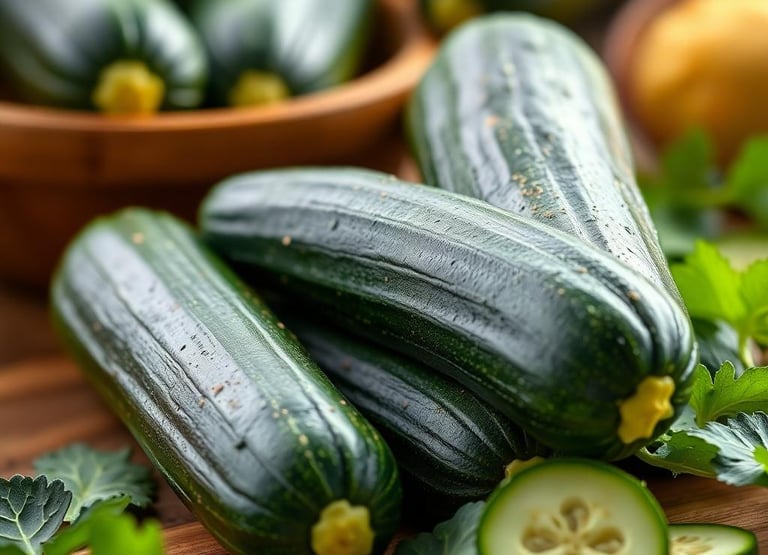

Zucchini benefits reach far beyond simple nutrition stats.
This vegetable supports wellness from the inside out, showing up as a steady source of way more than just vitamins.
Here’s a closer look at three different ways zucchini can fit into a healthy lifestyle and make a real difference in how you feel day-to-day.
Supports Heart Health
Your heart likes it when zucchini lands on your plate. The fiber, potassium, and antioxidants in zucchini all work together for heart support.
Fiber: Zucchini benefits your heart by providing dietary fiber. Fiber binds to cholesterol in your digestive system, helping reduce “bad” LDL cholesterol. Even a moderate fiber bump can cut down your risk for heart disease, as shown in a study published in the Journal of the American Heart Association.
Potassium: Zucchini gives your body a fair amount of potassium per cup. Potassium naturally helps your blood vessels relax, which supports healthy blood pressure. The American Heart Association recommends potassium-rich foods for anyone looking to support heart function without relying only on medication.
Antioxidants: The skin and flesh of zucchini both offer antioxidants such as vitamin C and lutein. These help guard your blood vessels from oxidative stress. Less stress means less inflammation, and that’s good news for long-term heart wellness.
Zucchini’s low sodium and high mineral content make it a smart pick for heart-conscious cooking. Add it to salads, omelets, or stir-fries for simple, everyday protection.
Promotes Healthy Digestion
If I’m looking to keep my gut happy, I reach for zucchini. This veggie is over 90 percent water, yet it’s packed with both fiber and nutrients that keep digestion on track.
Here’s what I notice when I add zucchini to my meals:
Gentle fiber: Zucchini brings soluble and insoluble fiber, which add bulk to stool and help food move smoothly through the system. You get digestive help without the harshness that sometimes comes with raw broccoli or cauliflower.
Hydration: The very high water content adds moisture to your gut, helping to avoid constipation. This matters, especially if you’re often on the go or don’t drink much water.
Prebiotic effect: The skin of zucchini contains fibers that may act as prebiotics, or “food for the good bacteria” in your gut. Healthy gut bacteria can improve absorption and reduce bloating.
For me, a serving or two of zucchini each day helps keep things comfortable. Mix it into soups, roast it, or try zucchini noodles for a gut-friendly side.
Helps With Weight Management
Zucchini benefits anyone focused on weight management thanks to its unique mix of being low in calories, high in water, and filling.
Check out why I use zucchini as a weight loss tool:
Low in calories, high in volume: You can load your plate with more zucchini and still keep calories low. One cup is only about 20 calories, which means you can eat a generous serving and not worry about your totals for the day.
Filling fiber and water: That combo keeps you satisfied after meals. Zucchini’s fiber slows digestion just enough to curb cravings, while the water content helps you feel full.
Flexible ingredient: Zucchini is one of the easiest vegetables to swap for higher-calorie foods. Spiralize it for “zoodles” in place of pasta, shred it into casseroles, or use rounds as a base for mini pizzas. The feeling of fullness lasts, and I don’t miss the extra starch.
Zucchini’s mild flavor slips into almost any dish without clashing.
Whether you’re slimming down or just want to eat mindfully, adding zucchini is an easy move with a real payoff.
You can see how these top zucchini benefits work together for overall wellness—supporting your heart, your digestion, and your weight goals.
That’s the kind of simple upgrade I look for when planning meals.
Zucchini’s Role in Disease Prevention
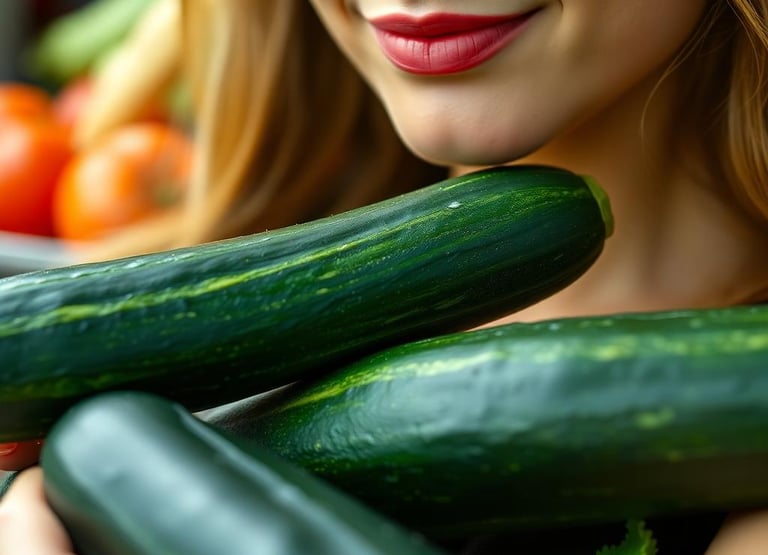

I’ve found that zucchini benefits reach beyond the table and right into the heart of lasting health.
Its gentle flavor hides powerful nutrients that give your body real support in protecting against several diseases.
Here’s how zucchini stacks up for your body’s defense, focusing on chronic conditions that affect millions every year.
Rich in Antioxidants for Cellular Protection
Zucchini is loaded with antioxidants. These natural compounds act like your body’s defense squad, swooping in to fight off stress at the cellular level.
The major antioxidants in zucchini include vitamin C, beta-carotene, lutein, and zeaxanthin.
Each plays a special role:
Vitamin C helps your immune system, encourages collagen for skin, and blocks free radicals before they cause damage.
Beta-carotene is a plant pigment that your body turns into vitamin A. It protects your vision and may lower risk for certain cancers.
Lutein and zeaxanthin gather in your eyes, helping shield them from blue light and slowing age-related vision decline.
Free radicals are unstable molecules that can harm cells and speed up the aging process.
When these build up (due to sun, stress, poor diet, or pollution), you’re at a higher risk for things like cancer, heart disease, or joint pain.
Antioxidants help mop up these troublemakers, keeping your cells safer day-to-day.
Zucchini’s skin is especially rich in these antioxidants, so I try not to peel it.
The mix of vitamin C and carotenoids works together, offering more protection when you eat a variety of antioxidant-rich foods. For me, this means regular zucchini in salads, omelets, or as a simple roasted side.
The taste is mild, but the benefit is real.
The potential benefits tied to the antioxidants in zucchini include:
Lower inflammation throughout the body
Reduced risk for chronic diseases like heart disease, some cancers, and macular degeneration
Support for the immune system by helping cells recover from daily stress
Potential Benefits for Blood Sugar Control
Zucchini benefits anyone looking to keep blood sugar in check, especially if managing diabetes or aiming to prevent it. The key? Zucchini’s combination of low glycemic index and plenty of soluble fiber.
Here’s why it matters:
Low glycemic index (GI): Foods with a low GI help keep blood sugar stable, without the big spikes you might get from white bread or sugary snacks.
Soluble fiber: This type of fiber, which is found in zucchini, slows down how fast sugar gets absorbed into your bloodstream. That means less risk for sudden highs (or crashing lows) after meals.
A diet rich in non-starchy vegetables like zucchini may help lower the risk of type 2 diabetes or help those with it manage their levels more easily.
When I include zucchini in my meals—whether as zoodles or cubed into stir-fries—I notice it helps me feel full without feeling sluggish afterward.
Other ways zucchini supports blood sugar control:
Fewer net carbs: Zucchini is much lower in carbs than potatoes or grains, making it an easy swap for people watching carbs or managing diabetes.
Stays filling: That soluble fiber isn’t just good for blood sugar. It also delays hunger, helping you skip unnecessary snacking between meals.
Research has suggested that a fiber-rich diet paired with low-GI veggies like zucchini can lead to:
Smoother blood sugar curves after meals
Lower long-term risk of insulin resistance
Better overall metabolic health
If you’re keeping an eye on your health markers, work zucchini into your favorite dishes. The effect is almost like putting a speed bump in sugar’s path, giving your body more time to process each meal in a calm, steady way.
With antioxidants at the cellular level and fiber that helps balance blood sugar, zucchini benefits your body as a true ally in disease prevention. It’s a daily habit worth building for anybody focused on aging well and staying vibrant.
How to Incorporate Zucchini Into Your Diet
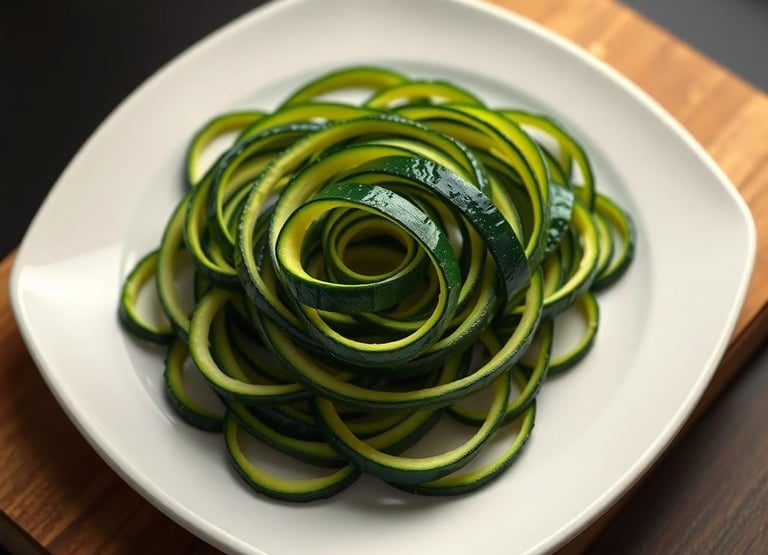

If you want to see zucchini benefits show up in your daily life, the easiest way is to start adding it to your meals.
Zucchini has a gentle taste and soft texture that match almost any dish, from quick breakfasts to savory dinners.
I enjoy the way it fits into recipes, sometimes standing in for noodles or adding a fresh crunch to salads.
Here’s how you can start fitting more zucchini into your diet without getting bored or overwhelmed.
Enjoy Zucchini Raw for Crunch and Fresh Flavor
Raw zucchini shines when it’s sliced thin or cut into matchsticks. Its subtle taste means it works in almost any salad or veggie plate.
I like to add it to:
Salads: Slice it into thin rounds or half-moons and toss it into your favorite greens.
Dips: Cut zucchini into sticks for scooping up hummus, guacamole, or ranch
Slaws: Shred it and mix with carrots, cabbage, and a simple vinaigrette for a light slaw.
Eating zucchini raw preserves all the nutrients and gives a satisfying crunch, especially perfect in summer.
Spiralize for a Low-Carb Pasta Swap
If you’re looking for a way to cut back on carbs or just want a fun twist at dinner, try spiralizing zucchini into noodles—what most people now call “zoodles.” This is one of my favorite tricks for boosting veggies and still getting a hearty texture.
Zoodles with Marinara: Top spiralized zucchini with your go-to pasta sauce. Add grilled chicken or turkey meatballs if you want more protein.
Stir-Fry: Quickly toss zucchini noodles in a hot pan with sesame oil, soy sauce, and your favorite veggies
Cold Noodle Salads: Mix raw zoodles with cherry tomatoes, roasted chicken, and a light lemon or pesto dressing
Zoodles take just a couple minutes to cook and soak up the flavors of whatever you add.
Toss on the Grill for Smoky, Tender Slices
Cooking zucchini on the grill brings out its natural sweetness and adds a hint of smoky taste.
I like to keep things simple:
Grilled Slices: Cut zucchini into thick rounds or lengthwise planks, brush with olive oil, and sprinkle with salt and pepper. Grill on each side until golden brown.
Veggie Skewers: Thread chunks of zucchini with bell peppers, onions, and mushrooms, then grill for a quick side or main.
Grilled Zucchini Salad: Combine grilled zucchini with feta cheese, fresh basil, and a squeeze of lemon for a meal-worthy salad.
Grilled zucchini fits any summer cookout or adds warmth to winter meals when cooked on an indoor grill.
Bake in Savory or Sweet Recipes
Zucchini mixes easily into baked dishes, soaking up other flavors and adding moisture without a heavy taste. I use it in both savory meals and sweet snacks.
Zucchini Bread or Muffins: Shred zucchini and mix it into classic quick bread or muffin recipes. It keeps baked goods tender and light.
Casseroles: Add chopped zucchini to lasagna or pasta bakes for extra veggies. It softens nicely in the oven and absorbs sauces well.
Frittatas & Quiches: Mix thin slices or shreds into eggs, along with cheese and herbs, for a breakfast that works any time of day.
When baking with zucchini, I leave the skin on for added texture and nutrition.
Make It the Star in Soups and Stews
Zucchini’s gentle texture means it cooks quickly and blends well with brothy or creamy bases.
Tuscan-Style Vegetable Soup: Add zucchini near the end of cooking so it stays bright and firm.
Zucchini and Corn Chowder: Dice zucchini and simmer with corn, potatoes, and a dash of thyme for a creamy, comforting soup.
Blended Cream Soups: Cook zucchini with onions and broth, then blend until smooth. Stir in fresh herbs for a bright, green finish.
Soup is an easy way to use up extra zucchini and tap into those zucchini benefits when the weather cools down.
Stuff and Roast for a Satisfying Main
If you want something that feels a bit more special, use zucchini as a vessel by stuffing and roasting it.
Stuffed Zucchini Boats: Halve zucchinis lengthwise, scoop out some of the flesh, and fill with a mix of lean ground turkey, rice, and tomato sauce. Top with a sprinkle of cheese and bake until bubbling.
Vegetarian Stuffed Zucchini: Use cooked quinoa, black beans, corn, salsa, and avocado for a meatless filling.
This makes for a filling meal that works for family dinners or meal prep.
Creative Ways to Enjoy More Zucchini
There are endless ways to eat zucchini, but a few quick ideas help me remember just how flexible it can be:
Add to Omelets: Toss in a handful of diced zucchini with your morning eggs.
Top Your Pizza: Use thin rounds or shreds as a pizza topper for a boost in color and fiber.
Layer in Sandwiches: Raw or grilled slices add bulk and freshness to sandwiches and wraps.
Pickles: Quick-pickle sliced zucchini in vinegar for a tangy snack or burger topper.
Tips for Quick and Easy Zucchini Prep
To get the most out of zucchini’s health perks, prep ahead:
Wash and store whole zucchinis in the fridge for up to a week.
Slice or shred extra zucchini and freeze for smoothies or future baking.
Don’t peel unless you need a super-soft texture—the skin holds many nutrients.
By mixing up how you use it, you unlock more zucchini benefits and keep meals interesting.
The key is to let zucchini’s mild flavor act as a trusty sidekick to your favorite ingredients while knowing you’re building healthier habits meal after meal.
Conclusion
Zucchini benefits show up in every bite, from better heart health to easier digestion and real support for weight goals. I see how its nutrients and versatility make it an easy favorite for almost any meal.
From salads and zoodles to cozy soups and quick snacks, adding zucchini is one of the simplest changes I make that pays off for my health.
This mild summer squash isn’t just a side dish—it’s a smart way to pack in more fiber, vitamins, and good-for-you minerals without much effort. Zucchini benefits every kitchen with its flexibility and value.
Thanks for reading and spending your time with me.
If you’re ready to boost your meals, bring more zucchini into your day and see the difference for yourself. Got a favorite zucchini recipe or tip? Share it below, and let’s keep the healthy ideas flowing.
Southern Spice Homestyle Delights © 2025. All rights reserved.
Address
Rayville, La 71269
Want more from Southern Spice?


Get recipes, cooking inspiration, and exclusive information right to your inbox!
Categories

